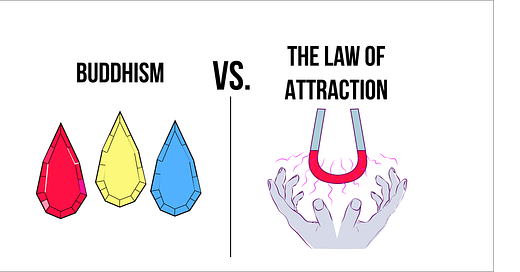It’s hard to know how popular the Law of Attraction is, but it seems like it must be quite a significant stream of thought/ self-help topic, in today's world. It’s been made popular by books such as Napoleon Hills ‘Think and Grow Rich’ and the film ‘The Secret’ by Rhonda Byrne. There is a big industry of Law of Attraction coaches, books, courses etc.
The law of attraction states that what we think about, what we feel and expect is what we attract in our life. So, if we constantly think about being poor and lonely that is what we will manifest. Whereas, if we think and expect to be rich and find our ‘soulmate’- that is what we will manifest.
One of the Buddha most famous saying is:
Experiences are created by mind, led by mind, and produced by mind.
If one speaks or acts with an impure mind, suffering follows
Just as the wheel follows the hoof of the ox pulling the cart...
If one speaks or acts with a pure mind, happiness follows,
like a shadow that never departs.*
At first glance these might seem to be saying the same thing so does Buddhist thought coincide with the law of attraction?
I suppose the danger of the law of attraction is that you enjoy visualising and fantasizing about what you want, and think that enough, you don’t try and do anything about it. I came across someone on YouTube who teaches ‘The Law of Assumption’ - an off shoot of the Law of Attraction that states that you have to train yourself using your imagination to believe that you already have what you want and then you will manifest it. This teacher goes so far as to say that if you want to win the lottery, you don’t necessarily have to be in possession of a ticket- its all about assuming you have it. She claimed it was also possible to see loved ones who had died through using this law. Other teachers are much less solipsistic, and say imagining your goal is a very important first step, and then you have to do the work to get it.
The latter would be a bit closer to the Buddhist view. You can talk about the Buddhist path in terms of Vision and Transformation- you have the vision, or intuition of reality, which you try to dwell in and keep in mind, then live your life in such a way that you bring yourself in line with your vision.
But as is fitting for a secular, materialist age, the law of attraction presents itself not as a religion, but a self-help doctrine, and its advocates tend to emphasize the law of attraction for getting lots of money or getting material things, or the perfect partner- it tends not to emphasize what is behind the drives for such things or what will really make us happy. As such it’s hard not to be a bit cynical about it. Maybe that’s a bit unfair, as many of the people who believe in it seem very well intentioned, and I think in many ways it is quite positive.
You can’t really compare Buddhism and the Law of Attraction though- one is a 2500 year old religion from India, while the other is a Self Help doctrine which has come about over the past 100 years from America.
Perhaps the Law of Attraction is a reaction against the rise of Scientism- the belief that only things that can be empirically proven are worth considering. This viewpoint rather removes the role the subjective plays in determining outcomes. It is arguably the dominant, or at least a very dominant view in todays world. The Law of Attraction and Buddhism, seek to reassert the importance that the mind plays in reality.
Interestingly, at the beginning of the movie the Secret, the Law of Attraction is presented as a secret that has been kept from the masses by some sort of elite kabal- something like the ‘illuminati’. It seems more likely to me, that it before the rise of scientism over the past few hundred years, there wasn’t such a disregard for the subjectve pole of our experience, it was just considered part of peoples lives- through spirits, magic, religion etc.
All this raises the question that all this raises for me- and it’s a question that runs through the history of philosophy, Buddhism and is at the heart of some of the arguments we’re having in the modern world- to what extent is the reality we experience created by our minds and subjective experience, and to what extent is our experience the result of our senses meeting the objective world ‘out there’?
This is a very mysterious and profound question; the answer to which is beyond us in our current state, as fixed in a subject/object duality, all our language is based in this dichotomy. The Buddhist approach to the question is the middle way- to not go to either extreme and eventually transcend the object and subject duality- which is a way of describing Buddhahood.






Ideas behind LOA have been around for millennia. At least that is how it seems when you read texts with LOA in mind. There is something to it, although maybe not exactly as it is taught.